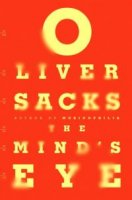 The Mind's Eye by Oliver Sacks (Alfred A. Knopf, 2010)
The Mind's Eye by Oliver Sacks (Alfred A. Knopf, 2010)
Books like this are why I need goal #63 (Read 26 existing but as yet unread books from my bookshelves) on my 95 by 65 list: I'm always finding reasons to get a new book out of the library. In this case, I was to visit a friend, who, like me, has discovered that she is face-blind. The Mind's Eye has a chapter on face-blindness, and I wanted to be more prepared for our discussion.
I had discovered my own face-blindness quite recently, while watching a 60 Minutes report. You can see part 1 of that report here, and part 2 here. The show also provided a test for face-blindness, which I failed spectacularly, though in reality the test is all but useless for people not well-versed in pop culture. Nonetheless, seeing my own life experiences reflected in the report was more than enough to put a name to my own disability.
Were it not so awkward, perhaps one should say, "face-visually-impaired," because the ability to recognize faces actually lies more on a bell curve, with about ten percent of the population with significant impairment—about the same percentage as of those with dyslexia.
Dr. Sacks himself has severe prosopagnosia, the technical term for face-blindness, along with another trait that is often linked with it: inability to recognize places.
The meeting of two people with prosopagnosia...can be very challenging. A few years ago, I wrote to one of my colleagues to tell him that I admired his new book. His assistant then phoned Kate [Sacks' assistant] to arrange a meeting, and they settled on a weekend dinner at a restaurant in my neighborhood.
"There may be a problem," Kate said. "Dr. Sacks cannot recognize anyone."
"It's the same with Dr. W," his assistant replied.
"And another thing," Kate added. "Dr. Sacks cannot find restaurants or other places; he gets lost very easily—he can't even recognize his own building sometimes."
"Yes, it's the same with Dr. W.," his assistant said.
Somehow, we did manage to meet and enjoyed dinner together. But I still have no idea what Dr. W. looks like, and he probably would not recognize me, either.
In neither trait am I anywhere near as badly off as Dr. Sacks, but this probably explains why my husband quickly developed a mental map of the city of Basel, Switzerland our first time there, whereas it took me several visits and—what was most efficacious—the opportunity to explore on my own, retracing my steps, memorizing landmarks, and such, before I became comfortable in the city at all.
The remaining six chapters of The Mind's Eye cover other aspects of the mental component of our visual experience, based on Sacks' research, the lives of his patients, and surprisingly often, his own health problems. The other subject that intrigued me the most was on stereo vision, which for people with normal eyesight also turns out to be more of a continuum than either/or. This chapter confirmed for me what I had noticed a while back: I can see stereoscopically with no problem, but I don't always do it. I find it entertaining to take the time, while looking at a scene, to think about stereo vision, and watch the landscape come alive. When I'm in a hurry, or thinking about something else—as I almost always am—I take in scenery as I gulp words from the page of a book: some details may be lost. My daughter reads more slowly, but creates a rich visualization of what she reads; I wonder if she is more aware of the three-dimensionality of the world?
Oliver Sacks has written many more books, most of which, I'm sure, are as interesting as this one. But I have #63 to work on....
Good job on reading books from your shelf!
I read Sack's "Uncle Tungsten: Memories of a Chemical Boyhood" and enjoyed it. Several of his other books are on my TBR list.
Not surprisingly, he has a TedTalk if you are so inclined.
And isn't it funny that I just watched a TV show where one of the characters had prosopagnosia? It was an episode of the Boston police show "Rizolli and Isles". A witness to a murder had prosopagnosia. Not very helpful!
BTW, Dr. Maura Isles, the ME, is played by Sasha Alexander, who was Caitlin Todd on NCIS. I know you like Ziva, but I remember Cait.
I liked her, too, and was sorry when she left. But of course it was the character I liked, not the actress.
I took the test, and got all of them right but one. (Here are the two people I mixed up: one's in the test, the other isn't. But they hang out together.)
The six women side by side confused me. The way the interviewer spoke, I thought all were the same person, but I only recognized the top middle with something approaching certainty, and knew I should know the bottom left name. Turns out there's a reason, which has to do with your pop culture complaint: Top middle is still an active actress doing acclaimed work, bottom left is an actress somewhat before my time, and the others are TV/news personalities, which I hardly ever see over here.
Fascinating stuff! The things we can't do...


